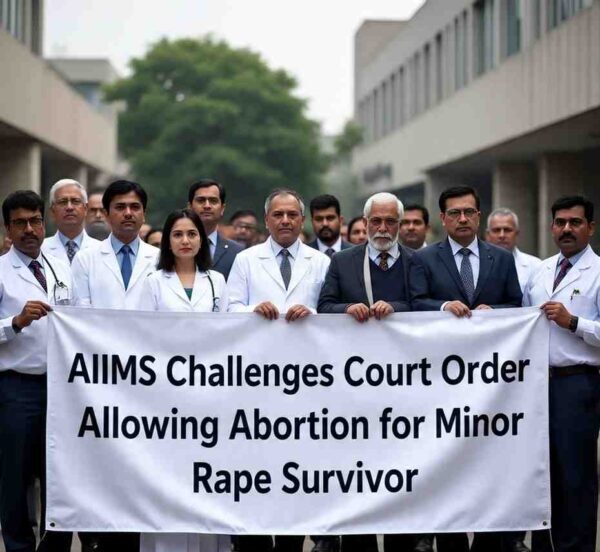AIIMS has approached the Supreme Court challenging a Delhi High Court order permitting a 16-year-old rape survivor’s abortion. Explore the legal, medical, and ethical implications of this controversial case.
Introduction
The All India Institute of Medical Sciences (AIIMS) has taken the matter to the Supreme Court, contesting a Delhi High Court decision that permitted a 16-year-old rape survivor to terminate her pregnancy—raising significant debates around medical ethics, legal rights, and judicial oversight. The matter is now under national scrutiny, raising significant questions regarding the Medical Termination of Pregnancy (MTP) Act, the rights of minors, and the obligations of healthcare institutions.
Background of the Case
On June 30, 2025, the Delhi High Court granted permission to a 16-year-old girl, a survivor of sexual assault, to undergo an abortion. The court’s ruling relied on the Medical Termination of Pregnancy Act, 1971, which allows abortions beyond 24 weeks in certain circumstances with judicial approval, especially when carrying the pregnancy to term could seriously endanger the woman’s physical or mental well-being.
The minor in question had approached the court through her guardian, stating that the pregnancy was a result of rape and that continuing it would cause her irreparable harm. The court, after reviewing medical reports and psychological evaluations, allowed the termination to proceed.
AIIMS’ Objections
AIIMS, one of India’s premier medical institutions, was directed to carry out the procedure. AIIMS subsequently moved the Supreme Court by submitting a Special Leave Petition (SLP), challenging the validity of the High Court’s ruling.
According to reports, AIIMS expressed concerns over:
- Medical Risks: The pregnancy had reached an advanced gestational stage. AIIMS claimed that terminating the pregnancy at this stage could be life-threatening for the minor and may violate established medical protocols.
- Ethical Concerns: The institution argued that it was being compelled to perform a high-risk medical procedure, possibly breaching its ethical obligations toward patient safety and staff responsibilities.
- Lack of Consent: The petition reportedly questioned whether the minor was fully aware of the consequences of the procedure and whether true informed consent was obtained, especially given her psychological condition.
Legal Issues Involved
This case presents a complex intersection of law and medicine. Key legal concerns include:
1. Right to Abortion Under the MTP Act
The Medical Termination of Pregnancy (Amendment) Act, 2021 expanded the time frame for abortion up to 24 weeks for certain categories, including survivors of rape. In exceptional cases, courts are authorized to permit termination beyond that limit based on medical opinions.
2. Minor’s Capacity for Consent
According to Indian law, a minor is not legally empowered to provide consent on their own. Therefore, the court’s role becomes crucial in ensuring the decision is made in the best interest of the minor, based on expert opinion and guardianship support.
3. Medical Ethics vs Legal Directives
AIIMS’s challenge reflects the tension between following a legal directive and upholding medical ethics. The Supreme Court will have to consider whether a judicial order can override a medical body’s assessment of procedural risk and ethical boundaries.
Supreme Court’s Initial Observations
The Supreme Court has decided to hear AIIMS’s appeal and has called for responses from the Delhi government and the guardian of the minor. The bench has emphasized that the court must balance the rights of the survivor, the risks to her health, and the autonomy of medical institutions.
Legal experts suggest that the case could set a precedent on how far courts can direct medical procedures, especially when institutional ethics and professional standards are involved.
Public Reaction and Expert Opinions
The case has triggered mixed reactions across the legal and medical communities. Women’s rights activists argue that AIIMS’s challenge undermines the autonomy and rights of rape survivors, particularly minors, to make choices about their bodies.
On the other hand, some medical experts have supported AIIMS, stating that compelling a hospital to perform a risky procedure against its clinical judgment may endanger both the patient and the medical team.
Conclusion
As the case awaits further hearing in the Supreme Court, it represents more than just a legal dispute. It is a litmus test for India’s reproductive rights framework, judicial discretion, and the boundaries of medical ethics in court-mandated care.
The verdict in this case will have long-lasting implications, potentially redefining the interplay between law, medicine, and individual rights in cases involving vulnerable minors and critical health decisions.

























